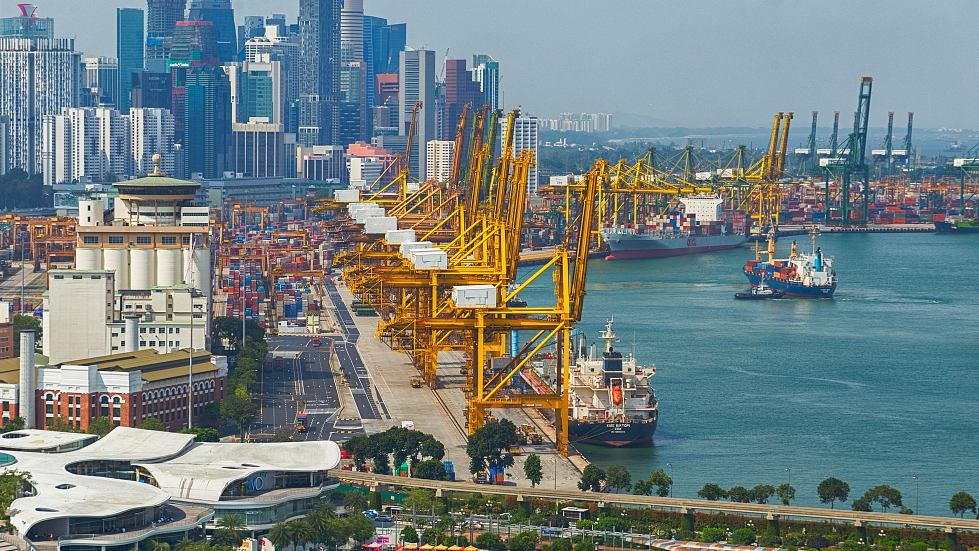
Editor's note: Iram Khan is a Pakistan-based commentator on international affairs. The article reflects the author's opinions and not necessarily the views of CGTN.
Days after White House economic adviser Larry Kudlow floated the idea of luring American companies back from China, a survey by the American chambers of commerce in Beijing and Shanghai has revealed that most companies have no plans to relocate.
The survey, in collaboration with the international accounting firm PricewaterhouseCoopers, was conducted in mid-March to assess the implications of COVID-19. The timing is interesting because it coincided with analysts' predictions of the impending slump in China's first-quarter GDP. Instead of getting apprehensive, these companies have decided to stay put and capitalize on the post-coronavirus growth.
The results echo a survey by the Chinese Ministry of Commerce, showing an increase in the resumption rate of foreign enterprises' businesses. These concurrent evaluations by local and foreign entities show that the epidemic has had little impact on investor sentiment.
American companies, having established themselves in China for the long term, frequently benefit from the host government's incentives. The country has a manufacturing-oriented economy, and fortunately, factory production did not fall to the anticipated level during the quarter. One reason was the provision of tax incentives and credit relief for those affected by the virus.
The situation in China is further improving, with global consumption inching up as several countries partially restart business activities. The brief hiatus in Chinese factory production is almost over because of a steadily resuming domestic demand and the crawling back of foreign markets.
A full-scale recovery will come with the pickup in logistics though it is not much of a challenge since transportation is about to jump back with the opening of factories. The surveyed companies are expecting the return to normal logistics operations within months. At the same time, they don't forecast the need to change their supply chain strategies at least in the next three to five years.
To offset the effects of the contagion, China has introduced concessions for foreign financial firms and scrapped limitations on the foreign shareholding ratio for local firms. Apart from that, the recently enacted Foreign Investment Law, the ever-shrinking negative list and a rising services sector have opened new avenues.
So, this would be an optimal time to take advantage of the Chinese market. Any investment now would pay off on the back of the coming recovery. The players making bold moves at this moment will have a greater chance of increasing their share.

A light show at Lujiazui area in Pudong District of east China's Shanghai. /Xinhua
A light show at Lujiazui area in Pudong District of east China's Shanghai. /Xinhua
The Chinese economy has the capability to rise swiftly from setbacks. After the financial crisis of 2008, when all major hubs were raking up losses, China came out relatively unscathed. Earlier in the post-World War II period, it took ages for developing nations to stand on their feet. China, however, took on an unprecedented poverty alleviation program and became the world's second-largest economy.
Now, during the COVID-19 pandemic, all countries are looking at China to see how soon it recuperates to steer them out of the downturn. This brings a two-fold responsibility: to reignite domestic growth as well as that of the world.
Stability remains the hallmark of the Chinese economic model that developed with three decades of reform and opening up. A consistent approach to attract new foreign ventures continued during this period and allowed existing ones to thrive.
The current disruption is merely a short-term effect that the Chinese economy is capable of redressing. At this critical time, it would be manifestly unwise for corporations to miss the opportunity.
The Trump administration, while it attempts to woo back American companies, has not retained the priorities of previous presidencies, let alone adopted a coherent one of its own. The U.S. political system presses the reset button every eight years – if not four – whereas the Chinese system has ample room for policy continuation. That is exactly why the gap between the largest and the second-largest economy is closing fast.
This is an age of globalized competition. If U.S. firms bow to the pressure of their government, they obviously cannot expect the vacuum to remain empty. China presents a lucrative market whose buying power is exponentially rising. The businesses that decide to leave will be missing out on a massive consumer base, and the evaporation of their expansion plans can become a reality.
Additionally, cost-effectiveness will be another leverage they will be losing out on. The provision of the best product at the best price is, unfortunately, not possible while manufacturing in the U.S. where the buying power of lower and middle-income groups has been severely affected by the epidemic. Larry Kudlow's intentions cannot be taken seriously at this hour due to the soaring financial pressures on the U.S. government.
U.S. firms operating in China have overcome the effects of the trade war. They have charted out survival and growth strategies in the post-coronavirus landscape too, without the option of an exodus. They know that if the first-quarter slump was a shock, skeptics will be taken aback with the rebound.
(If you want to contribute and have specific expertise, please contact us at opinions@cgtn.com.)